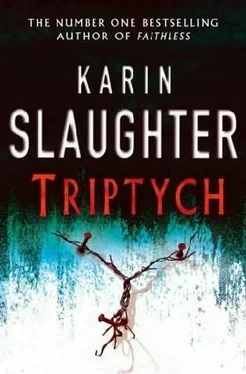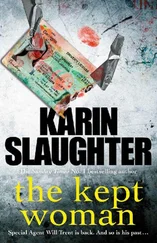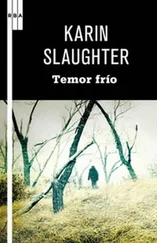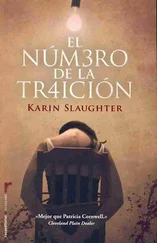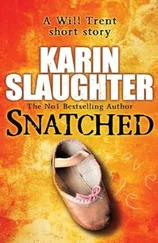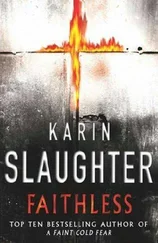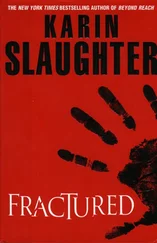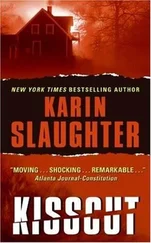Will echoed something that Angie had said about the girl. “You can’t help somebody who doesn’t want to be helped.”
“That’s true,” the mother agreed. “Do you have children?”
“No, ma’am. I don’t have any children.”
“It’s the most wonderful blessing God has given us, our ability to bring a child into the world.” She held out her hands, cradling an imaginary infant. “You hold them in your arms that first time, and they are more precious than gold. Every breath you take after that is only for your child. Do you understand what I’m saying?”
Will nodded, his chest feeling as empty as her arms. He figured even if his own mother had held him, she obviously had no problem handing him off to somebody else shortly after.
Miriam continued, “Aleesha got mixed up with this boy.” He could see tears wetting her eyelashes. “I grew up poor, as did Dr. Monroe. We both knew the value of a good education, though, and we worked very hard to take advantage of the opportunities that other folks had fought, even died, for.”
He tried to compliment her. “Obviously, you’ve succeeded.”
She gave him a glance that said they both knew that material things were hardly a measure of success. “We thought raising our children here in this neighborhood would protect them. Decatur has always been a little oasis.”
“Drugs have a way of getting into any community.”
“I suppose that’s true,” she allowed. “We wanted so much more for her. You live through your children. You ache for them, hurt for them, breathe for them when you can.” She told Will, “She ran off with some man she met at the treatment facility. She was arrested a few weeks later on a drug charge. Aleesha went to jail and the man disappeared, probably found himself another silly girl.”
When Will started with the GBI, he had been amazed to find how many women ended up in jail because their boyfriends had sent them out on a deal, convincing the women that cops were more lenient with the fairer sex. Prison was full of young girls who thought they were in love.
Miriam interrupted his thoughts. “Dr. Monroe and I realized very gradually that drug addiction is a terminal disease. It is a cancer that eats families alive.” She stood up and walked across the room to the grand piano, saying, “You get to a point where you look around and you ask yourself, ”What is this doing to the rest of my family? What harm am I doing to my other children by concentrating all of my energy on rescuing this one child who will not be saved?“ *
Framed photographs lined the piano, and she held her hand over each of them in turn. “Aleesha was the last girl. We called her our middle child because she was such a handful.” She went to another frame, another child. “Ashley is the oldest. She’s a gynecologist, like her father.” She indicated yet another photograph. “Clinton is an orthopedist. Gerald is a psychiatrist. Harley is a classical pianist. Mason…” She picked up a small frame shaped like a dog and laughed. “He’s a dog groomer, God love him.” She was extra careful as she put the frame back in place and Will wondered if Mason was his mother’s favorite.
Six children. A comfortable house. Plenty of clothes and food and parents who took care of you. What would it be like to grow up in a family like that? Why had Aleesha turned her back on all of this?
Of course, Will had been in law enforcement too long to take all of this on face value. He knew from experience that drug addicts didn’t generally start out as the happiest people on earth. They turned to drugs for a reason, whether it was the desire to fit in or the need to tune out. The absent father could be some kind of sadist. The brothers could have looked no farther than the hallway for their first sexual forays. The older sister could have been an overachiever who cast the kind of shadow in which nothing could grow.
But Will was not here to rattle the skeletons in the Monroe family closet. He was here to tell this woman that her daughter, lost so long ago, was finally lost forever.
He asked, “You haven’t seen your daughter in twenty years?”
“At least.”
“No phone calls? No cards or letters?”
Miriam recalled, “A few years ago we got a call. She was in jail. She wanted money.”
Michael had said that Aleesha listed only Baby G as a contact when she’d been arrested, but the duty officer would have made a notation of who she called while she was inside, who visited her if she was kept more than a day.
He asked, “Were you the one who spoke to her?”
“Yes,” she answered. “The conversation didn’t last more than a minute. I told my daughter that I was not going to give her any money and she slammed the phone down on me.” Miriam explained, “That was the last time we heard from her. I don’t even know where she lives now.”
“Do you have any idea who she associated with? Who her friends were?
She shook her head. “I’m sorry, Officer. I warned you I would be little help in finding her.” She looked down at her hand, which was still resting on the piano. “Could you tell me what she’s done? She hasn’t…” She glanced up at Will, then back down again. “She hasn’t harmed someone, has she?”
Will felt a lump rise in his throat. “Do your other children live close by?”
“Not close enough,” she told him, a smile playing at her lips. “Mason is just down the street, but that’s never close enough when you’re a grandmother with three grandbabies to spoil.”
“Maybe you should give him a call.”
Her smile faltered. “Why would I need to do that?”
“Mrs. Monroe, I really wish you would call your son, or somebody who could maybe come and sit with you.”
She sagged against the piano much as she had done at the front door. The dog gave a low growl as Will stood up.
Miriam’s throat worked. “I suppose you’re going to tell me that she finally took too much.”
“No, ma’am.” Again, he indicated the couch. “Would you please sit down?”
“I’m not going to faint,” she told him, though her chocolate complexion was a marked shade lighter. “Tell me what happened to my daughter.”
Will should have just told her and left her with her grief, but he couldn’t. To his surprise, when he spoke, he sounded as if he was begging. “Mrs. Monroe, please, sit down.”
She let him lead her over to the couch and sit beside her. He should take her hand, do something to soothe her, but Will didn’t feel equipped to comfort her. He did know that prolonging the inevitable was one of the most selfish things he had ever done in his life.
He said, “Aleesha was murdered Sunday night in the stairway to her apartment.”
Miriam’s mouth opened as she gasped for air. “Murdered?”
“Someone killed her,” Will provided. “I think she probably knew her attacker. I think that she followed him out into the stairway and he injured her…” He faltered. “He injured her in such a way that it led to her death.”
“ ‘Such a way,” “ Miriam echoed. ”What does that mean? Did she suffer?“
He was supposed to lie-it did no harm telling a mother her child had died quickly-but he could not. “I don’t think there’s any way to know if she was aware of what was happening to her. I hope she wasn’t-” He stopped. “I hope there were enough drugs in her body so that she had no idea what was going on.”
She gasped suddenly. “I saw it in the paper. A woman was murdered at Grady Homes. They didn’t list her name, but… I never thought, I just assumed…”
“I’m sorry,” Will told the poor woman, thinking he’d said that phrase more times in the last few days than he had in his entire life. He took out the photocopy of Aleesha’s letter. “We found this in her mailbox. It was returned because there wasn’t enough postage.”
Читать дальше
